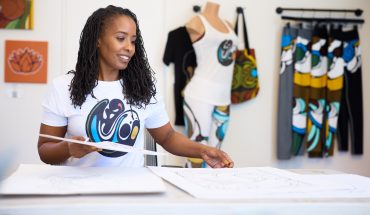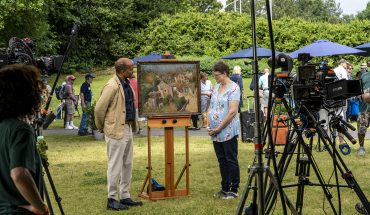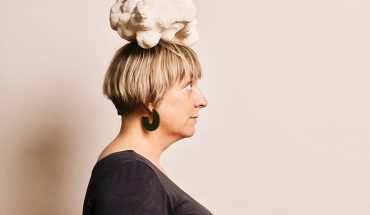by Ayn-Monique Klahre | photography by Taylor McDonald
The Spoonflower origin story: In 2008, Stephen Fraser’s wife was looking for the perfect polka dot fabric to make a pair of drapes. Surely, he thought, you can get it printed somewhere—after all, you could get your photo printed on a mug. But you couldn’t; the few custom print options demanded either huge quantities or high prices.
So Fraser teamed up with Gart Davis; they’d worked together at a print-on-demand book company. Together, they hacked a large-format printer to work with fabric—and Spoonflower was born. “The first years were about providing crafty people with a way to create their own unique fabric,” says company president Allison Polish, who joined the team as a partner and owner in 2013. Through the site, anyone could upload their own design and get fabric made.
It’s a customer-responsive and technology-driven company, and they’ve adjusted along the way. For example: They quickly found that graphic designers didn’t just want to print their own fabric for their own purposes, they wanted to sell it—so they created the Marketplace. With the rise of Etsy, they found that “momtrepreneurs” were using Spoonflower as part of the supply chain for their own brands. “There is this whole group of entrepreneurs making unique, special things to sell,” says Polish.
Today, Spoonflower also offers print-on-demand wallpaper and finished home goods, like bed and table linens. They’ve opened up a factory in Berlin to serve a growing international base. And in February, they brought in a new CEO, Michael Jones, who comes with a background in web retail.
Despite its growing and global reach, the brand feels strong ties to North Carolina, and to the Triangle in particular. “We’re proud to be part of a rich textile state,” says Polish, citing the textile programs at N.C. State and Meredith, as well as nearby Cotton Incorporated and [TC]2 as creative feeders to its efforts. “We love that we’re bringing this tradition back to the state.” The company frequently hosts local makers in their studio space for sewing lessons, design workshops and charity meetups. “Part of our ability to exist is that the Triangle has this amazing convergence of new and old, of technology but also the history with textiles,” says Senior Vice President of marketing Sarah Ward. “Spoonflower is be here because innovation brings these textiles to life.”







